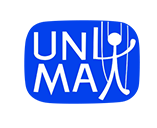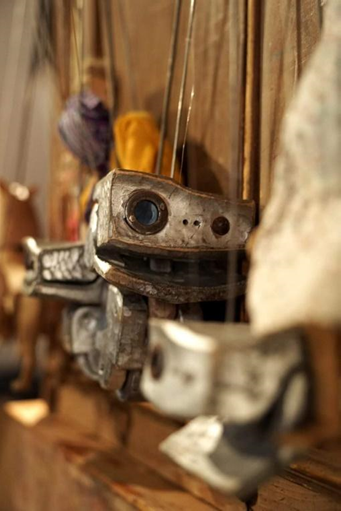What are the numbers that encode beauty, the encrypted grip that encloses, transforms, transmits, decodes but, somehow, fails to imprison or stifle the soul of this beauty? Not because of technology, but in spite of it, beauty, that spectre, that treasure, circulates unharmed in the new technologies.
(Salman Rushdie, Furie, Part One, 2001)
“Anyone today can claim to be filmed. As we know, the oldest works of art were created to serve a ritual, first magical, then religious. In the age of mechanised reproduction, it is the aura of the work of art that withers away.
(Walter Benjamin, ‘The Work of Art in the Age of Reproducibility’, 1936)
.
What do puppets dream of? Do they dream of sheep in the same way that a cyborg might dream of cyborg sheep? Is the puppet just a preliminary stage in a history of progress, in which the puppet would be the prefiguration of the autonomous creation of a robot? Is the term ‘robot’ part of the imagination of a play by Karel Čapek (R.U.R, Prague, 1920)? And does it mean “slave”? Or is it the Kabbalistic “Golem” creature that haunts the streets of Prague (Gustav Meyrink, 1915)? Or the even more terrifying Frankenstein, in the patchwork of a body that is assembled part by part by stitching (Mary Shelley, 1818)? Mechanics meets flesh. Calculation meets sentiment. Artifice emancipates itself to create a doubling of nature, or even a new nature. Artificial intelligence further reframes the question of intelligence and free will, or even the subjectivity of a robot created in the image of man, or of the gods that man wishes to build, new idols or future hybrids of gesture, speech and thought… Is the robot a mechanical puppet with a mind? Will the robot one day be more than human? Does an android have a face? “Does it dream of electric sheep at night (Philip K. Dick, 1966)?
Does artificial intelligence have a conscience? Can algorithms be thought? The virtual is not so much virtual as it is already real. New doors and new windows to multiply the possibilities of looking, understanding or simply feeling and developing the senses and creativity. Prometheus is never far away, and isn’t Pinocchio’s dream to become a real child? The puppet has never been so much the subject of man’s essential question. Aren’t we all puppets in the sense that we ourselves are puppets and puppeteers? Can we imagine a puppet becoming a puppeteer in its own right? The puppet is a word, a gesture, a material, a resonance, a dream of material that requires spirit. Every object is a puppet. Spinoza dreams of the uncanny valley (Mori, 1970). .
Can machines dream? Can puppets dream? What is a dream? Can you create spirit from matter? The myth of the demiurge meets the myth of the puppeteer. The creator of Nature meets the creator of theatre. Creating is always about creating a dramaturgy. What happens when you enter a puppet museum? Are the objects already just lifeless objects, strange and already immaterial in their materiality? The puppets look at us and speak to us. A puppet is much more than a simple or complicated mechanism. Bastien and Bastienne (a puppet opera by 12-year-old Wolfgang Mozart) dream of love and sheep. Multiplicity and daydreams. So let’s draw a sheep? (Antoine Saint-Exupéry, The Little Prince, 1943)
Like every year, World Puppetry Day has a theme – the theme of the robot, of the nature of the material, of the puppet who is no longer just a puppet but also a puppeteer, of the double who is never really a double, of the object that becomes the subject, of the gesture that becomes the horizon, of the landscape that becomes a butterfly, of the flower that becomes a face. This proposal is crazy, disturbing and as challenging as it is intriguing. It is as contemporary as it is ancient. It lies at the very heart of the practice of puppetry, as the primary poetic intention of all creativity. Artifice is always much more than artifice. Eternity, always another eternity for a time that changes, because eternity changes at every moment. And incredibly, the future changes the past and the eternity of memories, so that we can always dream. .
Dimitri Jageneau
General Secretary of UNIMA International
© Photo by Dasha Knerova from the show Iotesanek by Divadlo B Prague. Credits: JEM Festival Brussels 2024.


In 2016 the theme for WP Puppet Theatre’s (Calgary Alberta, Canada) Puppet Power Conference was “Connecting Generations”.
Sally Truss, Calgary, author and thinker, hosted a panel to discuss Social Robots. We contend that a robot is a cousin to a puppet. A social robot is special and currently as AI expands, these thoughts from 2016 might help to frame the discussion.
https://www.wppuppet.com/articles/social-robots-puppet-cousins
In 2022, the theme for WP Puppet Theatre’s (Calgary, Alberta, Canada) Puppet Power Conference was Non-Human Voices.
As well as the shows and workshops, we hosted a fascinating online conversation with panellists Paulette Richards, Clem Martini, Larry Kaputska, Matt Smith and Wendy Passmore-Godfrey. We asked, “Is it time for the non-human voice to be heard?”
The transcript of the conversation is here: https://www.wppuppet.com/s/CONVERSATION-TRANSCRIPT.pdf